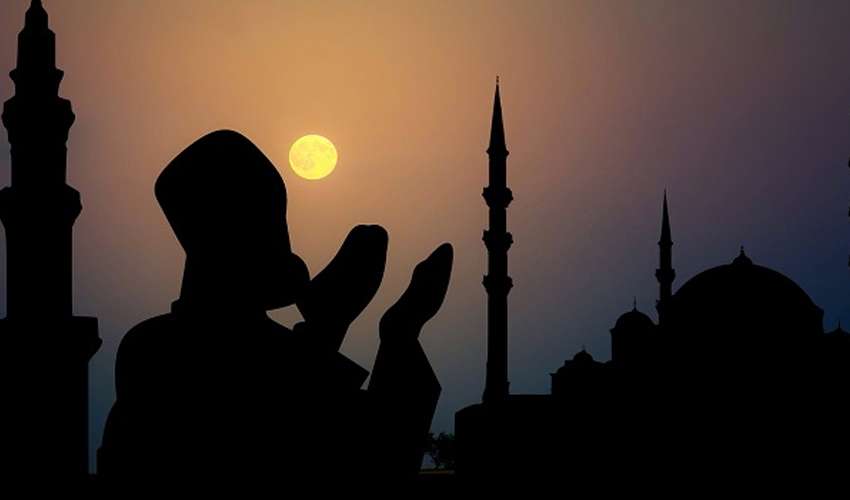The blessed month of Ramadan is considered the third of the five pillars of Islam, without which no Muslim’s Islam is correct. Fasting means abstaining from all things that break the fast, such as food, drink, and sexual intercourse, from dawn to sunset. People fast it with joy and happiness, and joy and spiritual feelings spread in the atmosphere. Family meetings, sessions, and dinners abound. And staying up late is during it, and the devils are imprisoned. It is one of the most blessed and special Hijri months for Muslims because God Almighty has imposed on them fasting on all days of this month as one of the acts of worship that brings the Muslim closer to his Lord, increases his good deeds, and brings him into Paradise, in addition to the fact that fasting is during this month. The month is one of the five pillars upon which Islam is based, along with prayer, zakat, and Hajj.
_The month of Ramadan begins when Muslims see the Ramadan crescent, the ninth month of the Islamic lunar calendar. Ramadan fasting lasts 29 to 30 days, depending on when the crescent of the month falls, based on visual sightings of the crescent. When Ramadan begins, adult Muslims must abstain from eating, drinking, and smoking between sunrise and sunset each day.
The month of Ramadan gains its value from the fact that it is the month in which the Qur’an was revealed to our master Muhammad (may God bless him and grant him peace) with Gabriel; peace be upon him on the Night of Destiny.
_Fasting was imposed on Muslims in the second year of the honourable Prophet’s migration, which is the year in which God Almighty prescribed fasting to Muslims as one of the acts of worship imposed on them. This year corresponds to 624 AD, and verses were revealed from the Holy Qur’an indicating its obligation to Muslims and that it was obligatory on those before them. Among the previous laws, God Almighty has explained the rulings on fasting and its timing in the verses on fasting in the Holy Qur’an, and the Messenger of God has described them in the honourable hadiths of the Prophet.
_The importance of the month of Ramadan:
- The Holy Qur’an was revealed to the Prophet Muhammad; peace and blessings be upon him.
- Fasting is imposed on Muslims.
- It is recommended that night prayers such as Tahajjud and Tarawih be performed.
- Its beginning is mercy, its middle is forgiveness, and its end is freedom from hell.
- Obedience increases, and sins decrease.
- It contains the Night of Destiny, better than a thousand months.
_The blessed month of Ramadan is associated with a unique, distinctive and beloved atmosphere, in addition to the spiritual atmosphere that characterizes the holy month :
- Families meet at one table to eat breakfast for Ramadan, as the family may not be able to meet during the rest of the year due to the busyness of its members and the differences in eating times from one person to another.
- Exchanging congratulations and invitations between family, relatives, and friends, creating familiarity, love, and harmony in society.
- There is abundant charity and giving to the poor and needy, as well as paying zakat on money to those who deserve it, and the obligation to pay zakat al-Fitr before the Eid al-Fitr prayer.
- Meeting to read and study the Holy Qur’an and interpret it in mosques and groups for adults and children. Qur’anic courses for children are also frequent during Ramadan.
There are many customs and traditions followed in the holy month of Ramadan, which differ among countries and societies
_Charity and Zakat in the month of Ramadan: Charity and Zakat in the month of Ramadan are considered among the most prominent aspects of the Holy Month due to the greatness and virtue of these deeds and the hope of doubling the reward for doing them in Ramadan.
Alms are abundant in Ramadan, in addition to acts of charity and benevolence. Hence, individuals distribute alms to people in need or resort to charitable associations and organizations that are more reliable, experienced, and efficient in charitable and relief work.
In this way, associations and organizations that allocate various projects during the Holy Month will be active, such as distributing water, dates, and food to passers-by, projects to break the fast for those who are fasting, distributing Eid clothing to the needy, holding Quran memorization circles for children, and others.
_Zakat al-Fitr: Zakat al-Fitr is estimated according to the controls of Islamic jurisprudence in the amount of a sale of food, barley, dates, or raisins. Some Islamic scholars have issued a fatwa declaring the permissibility of paying zakat al-fitr in cash equivalent to the value of a sale (approximately 3 kilograms) of the food of the country’s people, such as wheat, for example.
The value of Zakat al-Fitr is estimated each year according to what is announced by each country or the mufti in the individual’s country of residence. Zakat al-Fitr is obligatory for every Muslim who owns more than he and his dependents need on the day of Eid.
_Why was fasting imposed on Muslims?
- Reminding Muslims of God and directing them to worship and obedience: Fasting represents an occasion to remember God and turn to Him with worship and obedience, as it gives the individual an opportunity to distance himself from desires and the world and think about spiritual matters.
- Teaching patience and endurance: It helps to learn patience, endurance, and alleviation of worldly desires, as Muslims know how to control lusts and desires and build a strong will.
- Enhancing sincerity and piety: Fasting helps enhance sincerity and purity and improve the relationship between a Muslim and his Lord, as the Muslim feels that he is worshiping and obeying God alone without any partner.
- Improving physical and mental health: Fasting allows the Muslim body to get rid of toxins and impurities, improve digestion processes, and improve mental health, discipline, and regularity in life.
- Bringing people together and enhancing love and solidarity: They feel that they are doing the same religious work at the same time, which helps bridge the distances between them and strengthen social relations.
- Fasting during Ramadan is one of the signs of Islam. Fasting is not just abstaining from eating and drinking. Abstaining from harmful types of behaviour makes a person humble and helps develop self-discipline.
- Ramadan fasting is one of the signs of religion. The true purpose of fasting is to attain holiness, gain resistance to evil and temptation, train oneself to be patient, empathize with those who are less fortunate, and show appreciation for everything God has given us.
_Features of the month of Ramadan :
- Fasting. Fasting during all days of Ramadan is the only fast imposed by God Almighty on Muslims.
- Tarawih prayer, which is the prayer that follows the Isha prayer, and its time is from after the Isha prayer until shortly before the Fajr prayer.
- Zakat al-Fitr, where every sane and capable Muslim, male and female, is obligated to provide Zakat al-Fitr on his behalf and on the members of his family whom he supports, with the necessity of offering alms to poor Muslims and the needy.
- The Holy Qur’an was revealed in Ramadan, and Laylat al-Qadr was made one of its nights, which is better than a thousand months.
_Benefits of fasting during the month of Ramadan:
- Moral and psychological elevation, calmness, and the prevalence of positive emotions.
- It softens the heart and thus makes one feel for the needy, the poor, and the needy because the feeling of hunger pushes a person to feel other things.
- Deterring oneself from taking inappropriate actions.
- Obtaining the satisfaction of God Almighty, obtaining good deeds, and entering Paradise.
- Raising oneself to be patient and disciplined, to endure and avoid hardships and sins, and to continue doing good deeds.
- Strengthening the will and educating oneself to be faithful. Purifying the heart enlightens it, encourages its tenderness, removes its harshness, and clears it for remembrance and thought. •Accustoming oneself to benevolence and generosity.
- Disciplining the soul and making it endearing to piety and fear of God Almighty.
_ The virtue of the month of Ramadan and its fasting: The month of Ramadan was mentioned in the Sunnah of the Prophet and the Holy Qur’an several times, with a detailed explanation of the virtue of this holy month and the virtue of fasting in it, which are represented in the following:
- Paradise is opened in the month of Ramadan Hell is closed, and the great and great devils are restricted during this holy month. The Muslim will have the most incredible opportunity to avoid sin and become closer to God Almighty through acts of worship and obedience that will bring him closer to Paradise and keep him away from Hell.
- Forgiveness of sins. God Almighty has given the fasting person in Ramadan faith and hope of seeking a great reward, which is forgiveness of sins that preceded the fast. However, fasting here does not mean fasting from food and drink only but rather extends to include fasting of the tongue, mind, heart, and senses from committing transgressions and sins.
- Opening the doors of forgiveness and repentance to draw closer to God Almighty, cleanse the soul of sins, and truly repent to God Almighty.
- Achieving social solidarity, in which rich Muslims feel while fasting poor Muslims and the state of hunger that they live in most of the time, while achieving the principles of social solidarity specified by Islam, such as charity and zakat, among others.
_The blessed month of Ramadan is the lord of the months and the season of good deeds, in which are the breezes of mercy and forgiveness and the good tidings of liberation from the flames. It is a month of goodnees,forgivenees and blessing in which good deeds abound, full of good deeds in which people exchange congratulations and love, as it is characterized by a spiritual atmosphere, including Tarawih prayers and the decoration of homes and streets.










